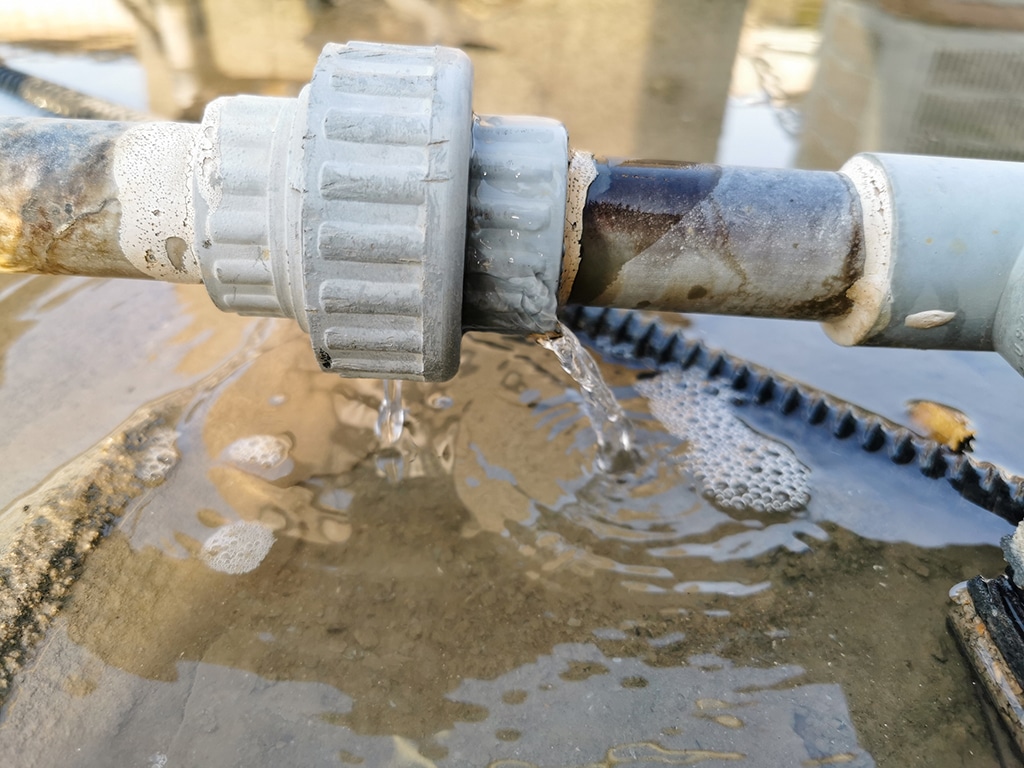
AC Repair: Is Your AC Leaking? Top 8 Possible Reasons For AC Leaks | Irving, TX
Photo By zms at istock
No matter how small, leaks in your home are a cause for concern. Not only are you worried about where the leak came from, but the damage it may cause to the flooring. A leak from your air conditioner needs to be handled quickly to not only avoid costly repairs but also prevent water damage. In such cases, it is crucial to get in touch with an Irving, TX AC repair expert who can diagnose the issue and offer a solution.
In this piece, we discuss how leaks are formed in order to grasp a better understanding of what causes them.
How Does the AC Work?
The AC is made up of several components that help cool your home. One of the parts is the evaporator coil which cools down the refrigerant running through the coils. It achieves this by extracting the heat and humidity from the air drawn from your home. The humidity then condenses on the unit’s coils in the same way a cold soda bottle produces a film of water once it comes into contact with warm air. This water is collected on the drain pan. Some of the water re-evaporates and helps cool the coils while the rest is transported to the drain system through your home’s piping.
Therefore, water on the drain pan is a sign that your air conditioner is working. If you notice that there is barely any water on the drain pan, it could mean that it is freezing on the evaporator coils. Likewise, excessive water is a sign that your air conditioner is not working and needs an AC repair.
Top Eight Causes of AC Leaks
A blocked condensate drain
As the indoor air circulates through your unit, dirt, dust, pet hair, and other airborne particles that pass through the air filter are carried off to the condensate drains. Over time, this could block the drain line.
The most obvious sign of a blocked or clogged drain line is a puddle of water around your unit’s drain pan. Other common AC repair signs include:
- A pool of water around the unit.
- An air conditioner that does not cool your home satisfactorily.
- Water near your unit’s condenser unit.
- Moldy smells emanate from the unit’s registers and vents or the drain.
- Your unit shutting off unexpectedly or if it won’t turn on.
To prevent this, an AC repair technician will inspect your unit during the recommended annual maintenance and clean up any build-up.
Regularly changing the air filters also limits the amount of debris that makes its way into your unit’s drain. You can further minimize this dirt by installing high-efficiency (HEPA) filters.
If you encounter a clogged or blocked drain, contact an Irving, TX AC repair expert as trying to remedy the problem yourself could worsen it.
A disconnected drain line
A disconnected drain line is mostly a result of improper installation. Any disturbance or vibration of an improperly installed unit causes the drain line to loosen and become disconnected. If your unit is installed in the attic, you could notice a wet spot on the ceiling. In severe cases, the ceiling may collapse.
As with a clogged drain line, you should have an AC repair technician reconnect your unit’s drain line.
A frozen evaporator coil
The evaporator coil is the component responsible for absorbing the heat from your indoor air. If something is wrong with the unit, the moisture that forms on the surface of the evaporator coils may freeze over, thus causing the unit to break down. Such a scenario may be caused by:
- Lack of sufficient airflow – Lack of airflow inhibits the coils from absorbing the right amount of heat to function optimally. This may be caused by damaged ductwork or a faulty blower fan. Dirty filters also clog up the system, including the coils, thus bringing an airflow problem.
- Dirty evaporator coils – When dirt and debris build up on the surface of the evaporator coils, they are unable to absorb heat and humidity from the air. This causes the condensate to freeze.
- Clogged drainpipe – This may cause excessive condensation on the coils, which eventually freezes up.
- Excessively low outdoor temperature – As the coils need to absorb heat from the air, extremely low temperatures will cause the condensation forming on the coils to freeze.
An AC repair technician will resolve this problem by thawing and cleaning the coils. They will also check the air filter and replace it if it is dirty or clogged.
Improper installation
If your air conditioner was installed recently and is leaking, the most probable cause is improper installation. For instance, if the unit and its drain pipes are not proportional, water flow to the drainpipe is disrupted, thus causing leaks. Also, if the surface on which your air conditioner stands is not leveled, it will start spilling water inside your house. If the surface is uneven, adjust the pad on which it rests.
Placing a window air conditioner on a surface that is too flat may cause the water to start flowing in the opposite direction, thus getting into your home. Such a unit should be placed in such a way that it is slightly tilted so that the water drains at the back and spills outside.
When installing a new air conditioner, always ensure that a qualified Irving, TX AC repair and installation technician does the job.
A damaged drain pan
The drain pan is located on the air handler or beneath the evaporator coils. Without this component, the water would drip onto the unit or your home, causing serious problems and water damage. As it is made of metal, it is highly susceptible to damage and rust. When this happens, the water it collects starts to leak rather than getting transported to the drain line.
During the annual tune-ups, the AC repair technician will check the drain pipe for cracks, holes, notches, rust, and any other sign of damage. If it shows signs of damage, they will replace it with another one that is appropriately sized for your air conditioner.
Low refrigerant levels
Also referred to as coolant, the refrigerant is in either a fluid or gaseous state and is found in the compressor. A common misconception is that the refrigerant level slowly depletes over time. In reality, a low refrigerant level is a result of unnoticeable puncture holes. Such holes may be as a result of:
- Weak joints and loose connections – Age and time may cause joints to become eroded and connections to become loose.
- Corrosion – As the majority of the components in your air conditioning unit are made of metal, they are prone to corrosion.
- Improper installation – Poorly fitted parts during the installation process may cause the coolant to escape.
- Wear and tear – Frequent use of your unit and age will take their toll on the unit, causing components to break down.
- Manufacturing defects – If the manufacturer does not detect a problem with your air conditioner before it leaves their factory, you may experience problems, including refrigerant leaks once it is installed. Factory defects may include missing parts, damaged components, poor assembly, and problems caused by improper handling.
Apart from water pooling around your unit, other telltale signs that may signify a refrigerant leak include a spike in your electric bills, a unit that takes too long to cool your space, hissing sounds, your air conditioner blowing warm air, and increased humidity.
In case your unit has a refrigerant leak, adding more of the coolant is not an effective solution. Indeed, doing so will cost you more as the cause of the leak has not been identified and repaired. Only a professional AC repair technician should diagnose and solve problems stemming from refrigerant leaks.
Remember that exposure to high levels of coolant is harmful to your health. Inhaling too much of it may cause dizziness, loss of coordination, poor concentration, and shortness of breath. Direct contact with high amounts of refrigerant may result in chemical burns or frostbite.
During your unit’s annual maintenance, your Irving, TX AC repair technician will check the refrigerant levels and advise you accordingly.
Dirty or clogged air filters
The filter in your unit should be changed regularly so that there is sufficient airflow throughout the unit. As mentioned, without adequate airflow, the water will freeze on the evaporator coils.
A faulty condensate pump
Ideally, the condensate pump should remove all the excess condensation your unit produces. When it becomes clogged, dirty, or malfunctions, it is not able to do its job perfectly. The excess condensation may result in a leak.
Small amounts of water from your AC as it is in operation are perfectly normal. However, your unit should not produce any condensation if it is not in operation. Also, any water puddles around your unit should dry out in a day or so. If this does not happen, it may be a sign of a persistent leak.
What Can I Do to Prevent Leaks in My Air Conditioner?
The only effective way of preventing AC water or refrigerant leaks is preventive maintenance. During this process, the AC repair technician performs tasks such as:
- Replacing dirty or clogged air filters – This eliminates airflow problems that could cause the evaporator coils to freeze over.
- Inspecting your unit’s ductwork and sealing any holes – The AC repair expert will check to ascertain that enough air comes from the registers.
- Clearing the area around the outdoor unit – If the condenser and outdoor fan get clogged with dust, dirt, and other debris, it will not expel heat as they should.
Are Leaks from My AC Dangerous?
Although water leaks from your air conditioner might not necessarily be dangerous, they could damage your home if they are not quickly resolved. On the other hand, refrigerant leaks pose serious health hazards to a home’s occupants.
Whichever type of leak your AC has, you should turn it off until the problem is solved by an AC repair technician. Using the unit despite the problem only aggravates the problem.
What Should I Do If I Notice a Leak in my Irving, TX, AC?
Once you notice that there is a leak from your unit, the first thing you should do is turn it off. While you can deal with obvious problems such as a damaged drain pan, you will want to leave other issues to a qualified AC repair expert. Your course of action should include:
- Assessing and containing the AC Repair situation – Turn off your unit until the leak is fixed.
- Begin the drying process – Mop up any standing water and remove any water from the carpet using a wet vacuum cleaner. To speed up the drying process, you may want to turn on fans to create a cross-current effect throughout the affected area. Alternatively, use a dehumidifier.
- Inspect the affected area – As you might not know how long the leak might have gone undetected, inspect the affected area for signs of mold and mildew growth. You might need to repaint any damaged drywall. If you experience such problems as badly soaked carpets, subflooring, or hardwood floors, you might need to involve a home restoration expert.
- Have a professional fix the leak – Have a local AC technician inspect your unit. An expert will quickly identify and solve any problems. They will also detect any un-related issues before they become costly repairs.
The Best AC Repair Service
The hot months of the Irving, TX, summer take a significant toll on your heating and air conditioning unit. If you notice that your air conditioner is leaking, get in touch with One Hour Air Conditioning & Heating of Dallas experts. Our technicians have the skills and resources needed to fix all sorts of air conditioner problems. Schedule an appointment for your unit’s repair, maintenance, installation, replacement, or even guidance on what unit would best suit your space. Get in touch with us today for more information about AC repair.





